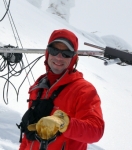Slope angle should be one of the first things that comes to mind when traveling in the backcountry. It is a primary factor in every avalanche. Avalanches happen when four ingredients are present: a slab, a weak layer, a trigger and a slope angle steep enough to slide, generally between 25-45 degrees. Not all slopes are steep enough to avalanche and some are too steep to regularly form slabs. Recognizing what slopes are safe to ride and what slopes are prone to avalanching is an important part of making safe backcountry decisions.
Blog List

The newest piece of avalanche safety gear to hit the market in the U.S. is the avalanche airbag. These backpacks have a canister of compressed gas that immediately inflates a large balloon when the emergency handle is pulled.

Statements of “warming” triggered dry snow avalanches have become common in the last few years. The public mentions it frequently and it is increasingly referred to in avalanche advisories and classes. The evidence presented includes increased creep rates, wild swings in net solar radiation and avalanche activity occurring naturally and with human triggers due to warming temperatures. These statements occur with certainty and regularity but with scant data.

Mountain riding on snowmobiles has exploded in popularity over the past 15 years. Every winter more riders hit the backcountry in pursuit of steep faces and untracked powder. This type of riding increases the inherent risk of being caught in an avalanche. Over the past decade, 41 snowmobilers have died in avalanches in Montana - more than any other state in the nation.

Countless individual ice crystals make up a snowpack. From the moment flakes fall from the sky to the spring melt, snow never stops changing. This change is known as snow metamorphism.

Imagine this terrifying scenario: You are at the top of a slope that just avalanched and buried three of your friends. Only you can save them. Their survival is up to you alone and the odds are very low because time is not on your side. A person has an 80% chance of surviving if dug up in 10 minutes. This rapidly falls to 20% at 30 minutes. Can you get all three to the surface in 15 minutes?

On December 31st, 2011 two people were killed in separate avalanches in the mountains outside of Cooke City, Montana. One victim was a skier; the other a snowmobiler and both were Montana residents.

The week of March 19 was a bad one for Central Asia. Heavy snow followed by a downpour of rain introduced their most widespread avalanche cycle in memory. Tajikistan, northern Pakistan and northern Afghanistan had avalanches hit roads and villages, many in the dead of night.

By mid-January over 2,400 people attended one of our 35 avalanche classes. Grade school and graduate students, skiers and snowmobilers, search and rescue groups, ski patrols and businesses attended classes, all there for the same thing—to learn about avalanches. Regardless of the user group, during the Q&A sessions people asked similar questions. Here’s an attempt to answer the most common ones.

In the summers I decompress and try not to think about avalanches. The problem is that I’m almost too good at it. Even after 12 years of forecasting, each fall my brain is fuzzy and rusty when it comes to snow. It’s an annual predicament that I’ll never get used to, but luckily there’s a simple solution that works every October-- I teach an avalanche course.

Avalanches are deadly. They kill more people on public lands than fires, lightning, floods or any other natural event. In the last 10 years 114 snowmobilers have died in avalanches in the United States. Triggering a slide can be terrifying. Getting caught is horrific. Digging out your partner is hell. Assessing snow stability is a difficult skill that’s never mastered. Like every avalanche forecaster I spend most of my days studying snow, yet I still sometimes get it wrong.

We just wrapped up our 22nd season of avalanche forecasting with 138 advisories. It was a busy, challenging winter and Mark Staples, Eric Knoff and I want to thank everyone for their support.

During the New Year’s weekend of 2011/2012, avalanches killed 3 people. Two of these fatalities
occurred in the mountains near Cooke City and the third in the Flint Range near Phillipsburg, Montana.
Snowmobiling in mountains is risky business. Once a rider leaves the groomed trail and enters the
uncontrolled and unpredictable backcountry he/she immediately becomes exposed to a variety of hazards. One of the inherent risks of backcountry snowmobiling is the possibility of triggering or being caught in an avalanche.


The Gallatin National Forest Avalanche Center, in conjunction with the Friends of the GNFAC, is dedicated to providing avalanche education to all backcountry users that enjoy the vast outdoor resources of southwest Montana.

All of us at the Gallatin National Forest Avalanche Center--- Mark Staples, Eric Knoff and I, Doug Chabot--- want to thank you for a great year. We are grateful for the community support of the Gallatin National Forest and Friends of the Avalanche Center. This month finishes our 21st year of operation with a record 145 avalanche advisories.

It's the best day ever! It has been snowing for three days straight- and now the sun is shining and the powder is perfect. You and your companions are in a secret location with not another rider around - your group couldn't be happier. But then...all of a sudden... you hear someone yell, "Avalanche!" You look up to see one of your friends high on the slope being swallowed by a wall of moving snow. What are you going to do?

